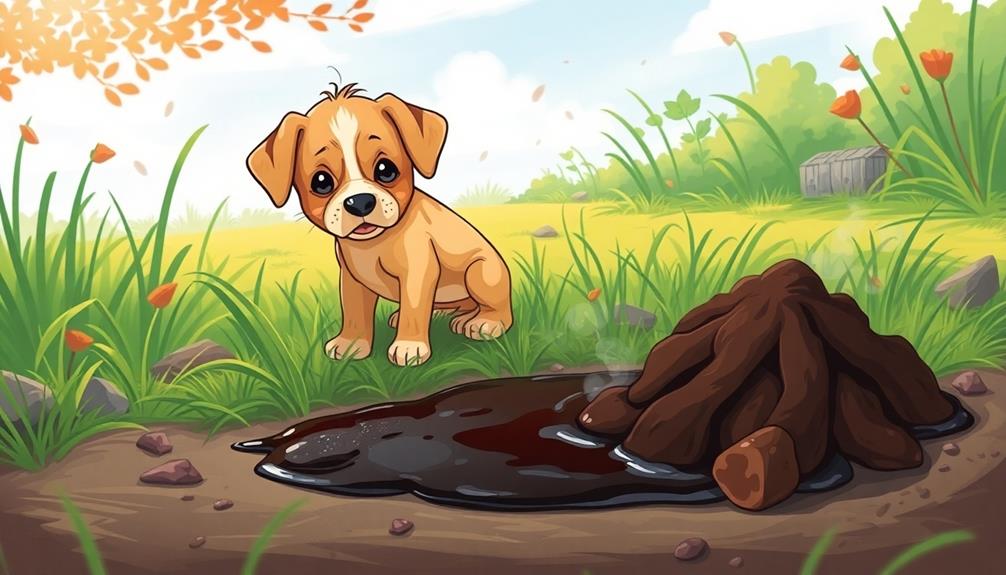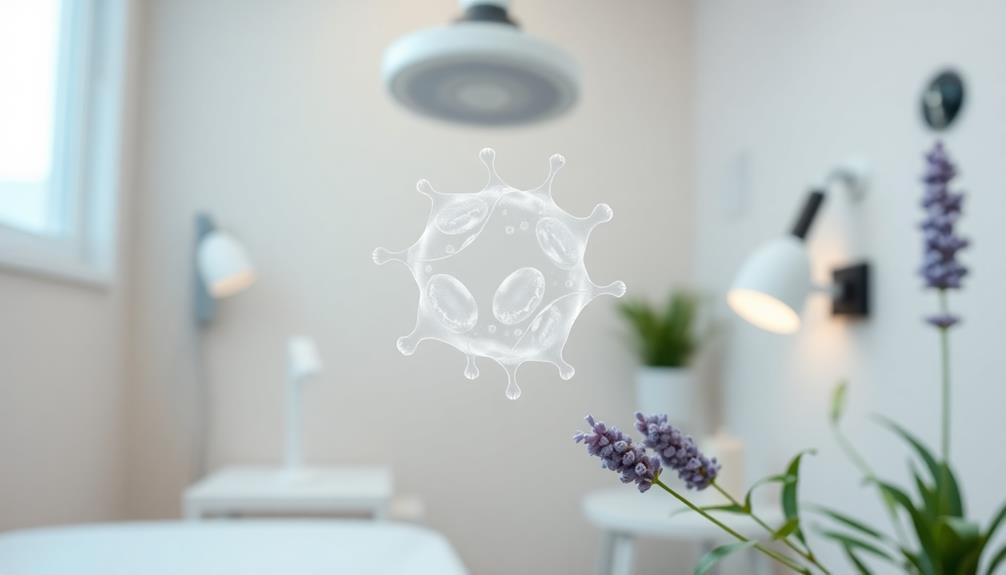Parvo poop smells really bad! You'll notice a strong, metallic odor with sweet hints. This foul smell comes from how the parvovirus affects a puppy's intestines, making food break down poorly. The stool often appears watery, slippery, and may contain blood or mucus, which adds to the stink. This smell is more common in places like kennels or dog parks, and it can linger for a long time. If you detect this odor, it's a clear sign that your puppy needs immediate attention. Stick around, and you'll discover more useful information about managing this serious condition.
Key Takeaways
- Parvo poop has an unmistakably foul odor, often described as metallic with sweet undertones.
- The smell results from the decomposition of food materials in the intestines, indicating severe gastrointestinal issues.
- Feces may be slippery or watery and can contain blood and mucus, amplifying the foul odor.
- This distinct smell serves as a warning sign of potential parvovirus infection in dogs, especially puppies.
- Immediate action is necessary if this odor is detected, as it signals a life-threatening condition requiring urgent veterinary attention.
Introduction

When dealing with a dog infected by parvovirus, you might come across a troubling symptom: the unmistakable smell of parvo poop. This foul odor can be alarming, especially for pet owners. It usually indicates that your dog, particularly puppies, is suffering from severe gastrointestinal issues.
The diarrhea resulting from parvovirus often has a slippery or watery consistency, making it even more concerning. The distinct smell comes from the breakdown of food material in your infected dog's intestines, which can also lead to mucus and blood in the feces.
While parvovirus itself doesn't have a unique scent, the feces produced during this illness can serve as a clear warning sign. So, if you notice a strong, metallic odor mixed with hints of sweetness, it's time to take action.
It's important to act quickly, as this condition can be life-threatening. Cleaning up after your dog may not completely eliminate the smell, especially if there are secondary bacterial infections.
Understanding what this foul odor means can help you provide better care for your beloved pet. Always consult your veterinarian for guidance and support.
Description of the Smell
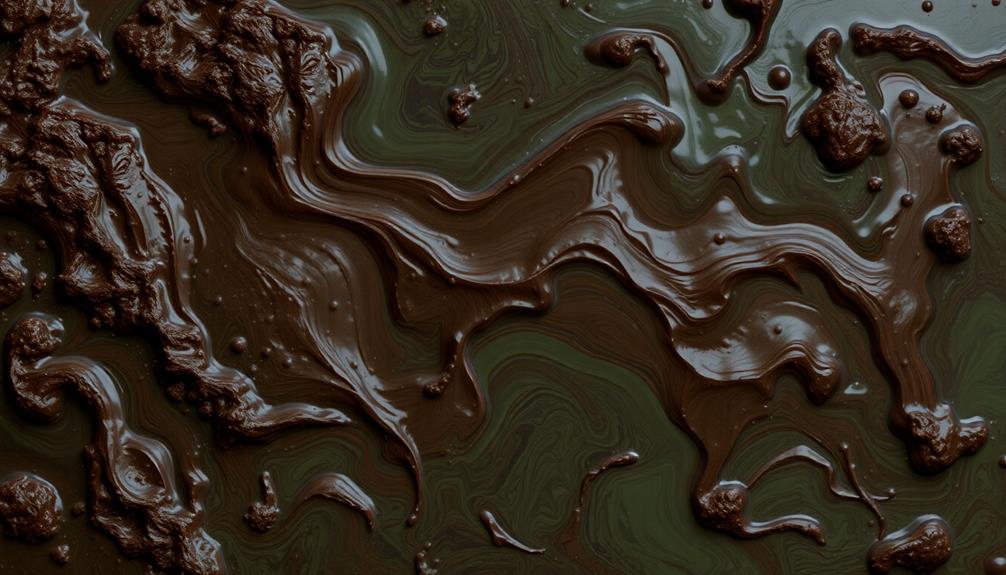
The smell of parvo poop is unmistakably foul, often hitting you with a metallic scent layered with sweet undertones and a strong, rotting odor. This unpleasant aroma comes from the breakdown of food materials in the intestines.
If you notice this smell, it's essential to act quickly, especially if you have unvaccinated puppies. They can show signs of gastrointestinal distress, which can make the situation even worse.
As you get closer, you might detect a more intense odor, particularly if there's blood and mucus present in the stool. These additional elements can make the foul odor even more pronounced, signaling a potential health crisis.
Sometimes, even after cleaning, the smell lingers, which could indicate secondary bacterial infections that often accompany parvovirus.
Being aware of the characteristics of parvo poop is crucial for pet owners and veterinarians. If you encounter this distinct, foul odor, take it seriously. It's a strong indicator that something's wrong, and immediate attention may be needed to help your puppy recover.
Always keep an eye out for these signs, as early detection can make all the difference!
Source and Composition
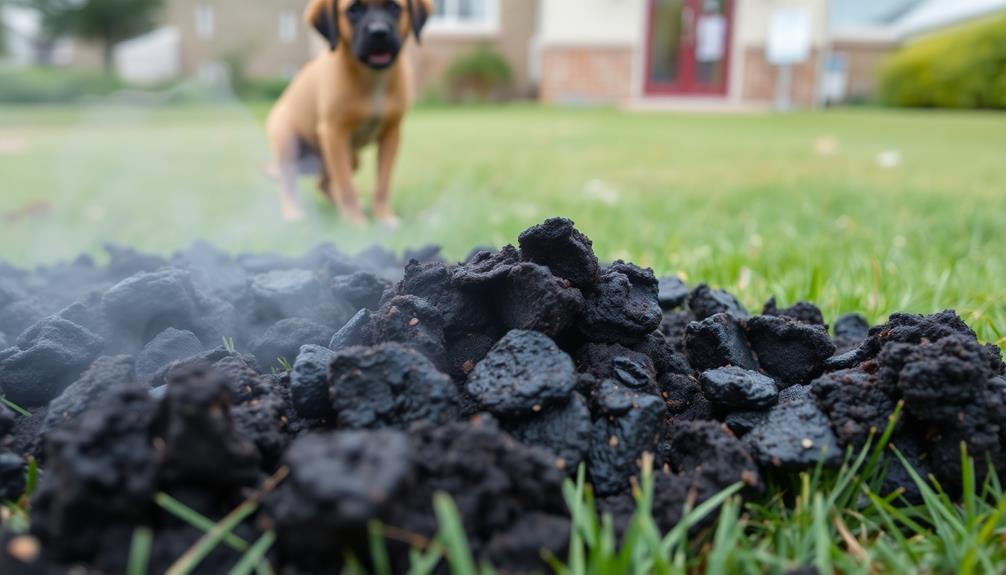
Parvo poop's source and composition stem from the severe impact of the parvovirus on a puppy's gastrointestinal system. When dogs are infected with parvo, the virus wreaks havoc on their intestines. This distress leads to diarrhea, causing food to break down improperly.
As a result, the feces produced have a distinct, foul smell that's often described as metallic, with hints of blood and a strange sweetness. The intense rotting odor comes from the decomposition of food material in the intestines. This smell can linger even after you clean up, hinting at the presence of intestinal bacteria that might develop alongside parvovirus. The odor may also be compared to other bodily fluids in terms of its pungency, though it’s usually much more overpowering and offensive. In contrast, what semen typically smells like is often described as having a mild, musky scent, sometimes slightly sweet or chlorine-like, depending on factors such as diet and health. The difference in scent profiles underscores the significant role that specific bacteria and bodily processes play in influencing the distinct odors of excretions.
The consistency of the stool can vary, sometimes being firm, other times slippery, and often mixed with mucus, which adds to the overall unpleasant aroma. If you notice your dog's feces smelling this way, it's a clear warning sign of a potential parvo infection.
Taking action quickly is crucial for the health of your furry friend. Always consult your veterinarian if you suspect that your dog might be infected with parvo, as early intervention can make a significant difference.
Typical Scenarios or Environments

In environments like kennels, dog parks, and veterinary clinics, the smell of parvo-infected feces can be particularly overwhelming.
When parvovirus attacks, it creates a distinct and foul odor that's hard to ignore. You might notice a metallic scent, mixed with hints of blood and sweetness, combined with an intense rotting smell. This is especially true in areas where unvaccinated dogs are present, as the virus is highly contagious.
If there are infected dogs around, the smell of parvo poop can linger for months, even after thorough cleaning.
Sometimes, the presence of blood or mucus in their feces can intensify the odor, showing the infection's severity. In high-risk areas, like veterinary clinics, detecting that awful smell may lead to immediate action to prevent the virus from spreading further.
If you're in these environments, it's crucial to stay alert.
If you spot parvo poop, make sure to keep your dog away and report it to staff. Avoiding contaminated areas can help protect your furry friend from contracting this dangerous virus.
Emotional or Cultural Associations

Many dog owners experience a rush of anxiety when they encounter the distinct odor of parvo poop. This smell is often described as metallic, with hints of blood and sweetness. For pet owners, it's a serious illness warning signal. When you smell it, your heart might race as you think about your dog's health and well-being.
In communities where the parvovirus is common, this odor can trigger collective memories of past outbreaks. It's a scent that connects everyone, reminding pet owners of the importance of vaccination and preventive care. The strong, unpleasant smell can create aversion and fear, pushing you to take immediate action if you suspect your dog might be affected.
This anxiety isn't just personal; it's shared among the community. Many people feel a sense of urgency to protect their pets and stop the virus's spread. The smell of parvo poop becomes a cultural signal, underscoring the importance of vigilance.
Health or Safety Considerations
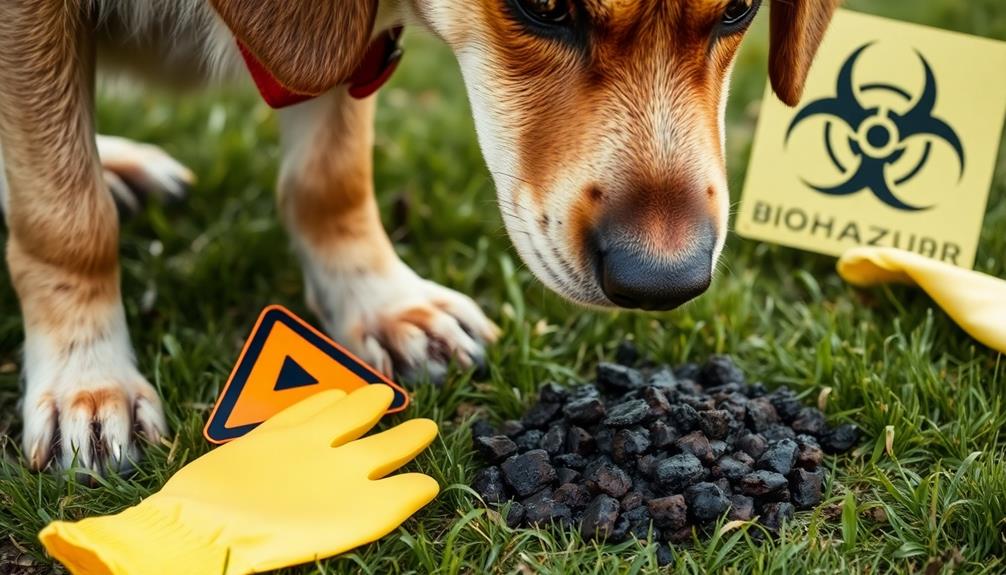
Recognizing the distinct odor of parvo poop can be more than just a signal of emotional distress; it carries significant health and safety implications for your dog. When your pup's feces smell metallic, with hints of blood and sweetness, it may indicate a parvovirus infection. This virus attacks rapidly dividing cells, particularly in the GI tract, leading to severe diarrhea that continues if left untreated.
If you notice a foul smell, along with symptoms like decreased appetite, it's crucial to act quickly. Puppies should receive a parvo vaccine to help protect them, but if they do contract the virus, early intervention is key. The longer the diarrhea continues, the more dangerous it becomes for your furry friend.
Additionally, the unpleasant odor can linger even after cleaning, hinting at possible secondary bacterial infections due to the compromised gut health of infected dogs.
Final Thoughts

While it might be easy to overlook the smell of your dog's feces, doing so can have serious consequences. If you notice a foul odor coming from your dog's poop, it could be a sign of parvovirus. This smell is often described as metallic, with hints of blood and a sweet scent mixed in.
It's a strong, rotting smell that can linger even after you clean up the mess.
Pay attention to the consistency of the feces, as it can vary from firm to slippery and may contain mucus. The odor from parvovirus-infected feces is a crucial indicator for you as a pet owner.
If you detect this unusual smell, it's important to seek veterinary intervention right away. Early detection and treatment are essential for effectively managing parvovirus in your dog.
Frequently Asked Questions
Does Parvo Poop Smell Different?
Yes, parvo poop does smell different. You'll notice a distinct, foul odor that's metallic and rotting. This smell often lingers even after cleaning, signaling the presence of the virus and potential secondary infections.
What Does Poop Look Like With Parvo?
When dealing with poop from a dog infected by parvo, you'll notice it often looks watery or slippery, sometimes mixed with mucus. It may also contain blood, indicating severe gastrointestinal distress that needs urgent attention.
What Colour Is Parvo Diarrhea?
Parvo diarrhea can range from yellow to brown, often appearing watery and bloody. You might notice streaks of red and a gelatinous texture due to mucus, indicating severe intestinal damage. Immediate veterinary care is crucial.
Do Puppies With Parvo Fart?
Yes, puppies with parvo can fart excessively due to gastrointestinal disturbances. You'll likely notice foul-smelling gas, often linked to other symptoms like diarrhea and vomiting. It's crucial to seek veterinary help if you observe these signs.
